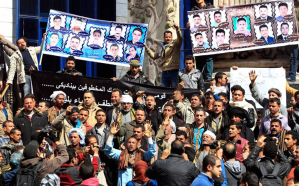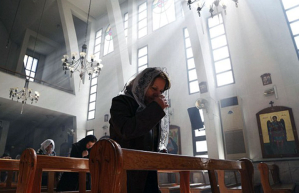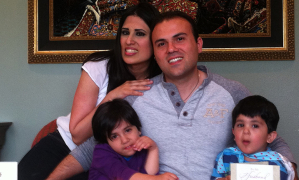
The terror group ISIS and its affiliates have been actively persecuting Christians and other minorities in the Middle East. According to one leader of a prominent organization, a Christian state in the region could be a possible solution for helping Christianity to survive that region in the future.
In an interview with Joseph Puder of Frontpage Mag, Joseph Hakim, President of the International Christian Union (ICU), argued that Middle Eastern Christians could survive in the region if they had their own state. Hakim is an American who was born in Lebanon and considers himself an Orthodox Christian.
"In the Middle East today, Christians are getting killed daily, their homes are being destroyed, young girls are raped by Muslims, and Christian refugees are escaping ISIS terror to Iraqi Kurdistan or Turkey, living in leaky tents during the cold winter," Hakim said. "The ICU, however, would like US Congress to be true to its commitment to uphold religious freedom, and safeguard the lives of our Christian brothers in the Middle East with an extensive humanitarian rescue action."
Puder asked Hakim on what he thought about the current political situation in Lebanon, a country that had set up its constitution for the presidency to be occupied by a Christian. He elaborated on how the government in his native country was supposed to work.
"Lebanon's independence in the 1940s meant to give Christians a safe haven in the region," Hakim said. "The Christian architects of the state thought that if they could build a nation based on equality and human rights, a secular nation would emerge that would impact the surrounding states."
However, Hakim told Puder that the Christians' power and position declined in Lebanon thanks to rivalry among Christian leaders and the Taif Agreement, which split Lebanon's Parliament evenly between Christians and Muslims. This agreement also meant the prime minister, which under Lebanon's constitution is a Sunni Muslim, had more executive power than the president.
"To the question of whether the Christians can regain their constitutional power, the answer is no," Hakim said. "To maintain the Christian character of Lebanon, the world Christian powers must commit their resources to it, and seek to replace the current corrupt Christian political leaders who do the bidding for Islamic Arab and Iranian petro-dollars."

Hakim then elaborated on the plight of Assyrian Christians in Syria, who have been targeted for persecution by ISIS.
"The ancient Assyrian Christian community has been the primary victim of [ISIS] brutality," Hakim said. "It seems as if history is repeating itself. One hundred years ago it was the Ottoman Muslim Turks who, like [ISIS], perpetrated genocide on Christians."
The Orthodox Christian then argued to Puder that UN or NATO intervention may be needed to prevent the ISIS bloodbath of Christians in the region.
"Recently, Christians began to defend themselves, but it is too little, too late," Hakim said. "They are fighting [ISIS] with few weapons and no training, and they are no match for [ISIS's] arms and fighters."
Hakim contended that under Sharia law "anytime and anywhere," non-Muslims are treated like "second-class citizens." He told Puder the story of his father, who worked in Iraq back in the 1950s.
"In the 1950s my dad was working in Iraq, and while riding in a bus on a hot day, his sweat dripped from his arm onto a Muslim sitting next to him," Hakim said. "At the same time, his tattoo with the image of Christ on his arm was exposed. The Muslim called him a kafir, and publicly insulted him with impunity."

Puder and Hakim then turned to the topic of Iran persecuting Christians. One of those people included Iranian-born American pastor Saeed Abedini, who has languished in an Iranian prison since June 2012 for "threatening the national security of Iran" through the Christian House Church movement; he never received due process in that matter, according to Hakim.
"The US Commission on International Religious Freedom reported Christians in Iran face harassment, intimidation, discrimination, arrests, and imprisonment," Hakim said. "Dissidents and human rights defenders are increasingly subject to abuse and several were sentenced to death and even executed for the alleged capital crime of 'waging war against God.'"
As for the future of Christianity in the Middle East, Hakim argued that barring a state of their own, Christians may cease to exist in that part of the world.
"Christians need a state of their own and an alliance with the US and Israel," Hakim said. "Otherwise, being leaderless and without a military force, Christians have no chance to survive."





![[Exclusive Interview] A revelation within the brink of life and death — Meg Leung’s mission in Christian art](https://www.gospelherald.com/media/cache/thumbnail/7/21/72163sp_273w_150h_1x_1y.jpg)

